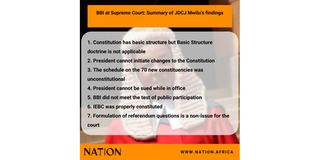Supreme Court puts a final end to BBI
The Supreme Court has nullified the Constitutional Amendment Bill, (2020) -- dubbed the Building Bridges Initiative (BBI).
Six out seven judges ruled that the President cannot lead a popular initiative to amend the Constitution.
Three judges held that President Uhuru Kenyatta was a promoter of the BBI proposed amendments. Two judges said President Kenyatta was not involved. two judges abstained from that vote.
The seven-judge bench is led by Chief Justice Martha Koome. Other judges in the bench include Deputy Chief Justice Philomena Mwilu and Justices Mohamed Ibrahim, Njoki Ndung’u, Isaac Lenaola and William Ouko.
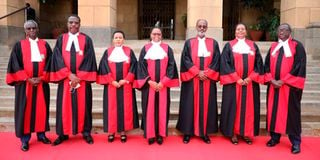
Chief Justice and President of the Supreme Court Martha Koome (centre) and Deputy Chief Justice and Vice-President of the Supreme Court Philomena Mwilu (third left) with Supreme Court Judges (from left) Isaac Lenaola, Dr Smokin Wanjala, Mohamed Ibrahim, Njoki Ndung’u and William Ouko at the Supreme Court Building in Nairobi.
Final judgment
1. Basic Structure is not applicable in Kenya.
2. President cannot initiate amendment through Popular Initiative - President Kenyatta initiated the BBI. Consequently under 257, BBI is unconstitutional.
3. Creation of 70 constituencies is unconstitutional for want of public participation.
4. Civil proceedings cannot be initiated against the President.
5. No obligation on IEBC to ensure promoters of BBI complied with requirements for public participation. There was public participation on BBI.
6. IEBC had quorum.
7. Issue of multiple question was not ripe for determination.
8. Each party to bear own costs of suit.
How the judges ruled
CJ Koome said the Basic Structure doctrine and the four sequential steps provided by the High Court and the Court of Appeal are not applicable in Kenya.
"The two Superior Courts below erred in introducing a procedure not provided for by stating that amending the Constitution ought to go through the four sequential stages (civic education, public participation, constituent assembly debate, and a referendum). Ultimately, they amended the Constitution by judicial craft."
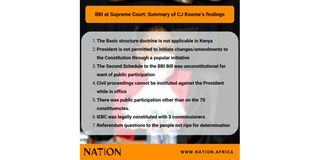
Next was Justice Ouko, who said the most difficult part of the superior court's judgments is the matter of Basic Structure.
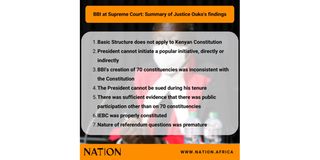
Justice Lenaola said the Basic Structure doctrine does not apply in Kenya. He added that the President cannot initiate a popular initiative, noting that the route is reserved for Wanjiku.
"But he can use the parliamentary route to amend the Constitution," he said.
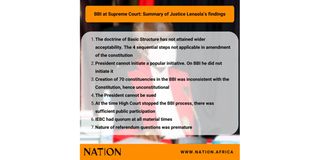
Next was Justice Njoki Ndung'u, who agreed with the judges before her that the Basic Structure doctrine is not applicable in Kenya. However, on the matter of popular initiative, she disagreed with the High Court and Court of Appeal which found that a President cannot be a promoter of the effort.
"The President is not limited on measures he can take in exercise of his powers. In promoting and enhancing national unity, he can initiate a constitutional amendment through a popular initiative." Justice Ndung'u said.
"There is no historical evidence that the President should be excluded from initiating a popular initiative to amend the Constitution. He enjoys freedom and rights like any other Kenyan," she added.
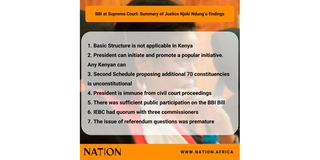
Justice Wanjala said the High Court and Court of Appeal erred in holding that the Kenyan Constitution has a Basic Structure.
"Basic Structure doctrine is not applicable in Kenya...They arrived to an erroneous finding," he said.
On the route the President took to amend the Constitution, he noted that the Head of State cannot lead a an initiative like he did for BBI.
"Popular initiative is reserved for common mwananchi. We cannot ignore the role played by the political class," he said.
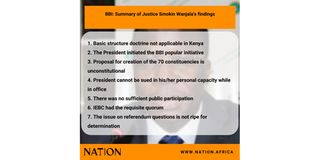
Justice Ibrahim said the Basic Structure doctrine is applicable in Kenya. He also noted that the popular initiative must be citizen-initiated and driven.
"The President holds the power to decide whether a referendum will be held. There will be conflict of interest if he was to initiate amendment of the Constitution through popular initiative. He is not like any other citizen," he said.
He also found that the proposal for creation of 70 constituencies is unconstitutional.
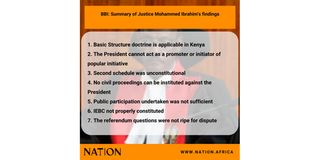
DCJ Mwilu said the BBI Bill was unconstitutional. She also noted that the Bill did not meet the test of a meaningful public participation.
On the matter of IEBC, she said that "IEBC was properly constituted..nothing was shown to the contrary".
